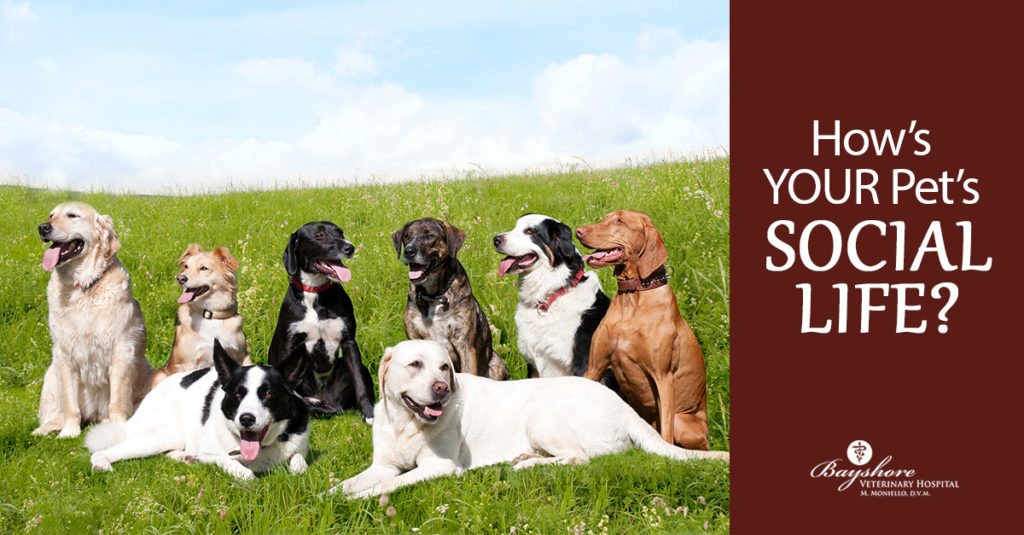Today, as never before, dogs participate in organized social programs that keep them on the go. Doggy Day Care, Dog Parks, Training Classes, Grooming Salons, Boarding Facilities, comprise some of the venues where groups of dogs, from varied backgrounds, gather to interact, and enjoy the pack dynamic.

On the surface, socialization is great for them, but the flip side of increased interaction with other dogs, is the potential for diseases to spread among them as they share water bowls, come in contact with one another’s secretions, share toys, and roughhouse together! Depending on their age (puppies and seniors are at greater risk), and their general health, an active social life can present some potentially serious concerns. Let’s look at some of the diseases that can spread relatively easily through these groups.
Kennel Cough
Recently, we’ve seen an uptick in the number of kennel cough cases among dogs who frequent group settings. This highly contagious virus often escapes detection because infected dogs frequently don’t exhibit symptoms in the early stages. By the time the runny nose and dry hacking cough arrive, the entire group has been exposed. There is a vaccine for kennel cough, but it isn’t routinely used with every dog. Lifestyle is the deciding factor. Since the Bordetella vaccine is good for 1 year, it’s important to keep your dog up to date if you plan on having them participate in any activity that includes repeated or confined exposure to dogs from outside your home.
Canine Distemper
This highly contagious virus is a threat to any dog who hasn’t gone through the vaccination cycle…particularly puppies. It’s an airborne virus with devastating, often fatal, consequences. Until they’re fully vaccinated, the only way to protect your puppy is to keep them away from dogs who are not part of your home.
Parvovirus
Parvo is another potentially devastating virus spread through contact with the stool of an infected dog, and on surfaces like water/food bowls, leashes, toys, even the clothing of humans interacting with the infected dog. Because of the high mortality rate associated with Parvo, the vaccine to protect against it is part of the core vaccines recommended for all dogs.
Leptospirosis
Lepto is caused by a bacteria spread through the urine of an infected animal. Drinking contaminated water or coming in contact with contaminated soil and food are all ways to contract the bacteria. In addition to fever, muscle weakness, and vomiting, infected dogs can suffer kidney and liver failure. The vaccine for Lepto is optional based on lifestyle, and it’s strongly recommended that you discuss its’ use with your Veterinarian.
Rabies
Rabies vaccine is mandated by law, for licensing, in most municipalities, and as a rule facilities where dogs gather require proof of vaccination. It’s important to remember, that unvaccinated animals exist all around us…raccoons, squirrels, skunks. Anyone is susceptible to the rabies virus, and it’s 100% fatal. Fortunately, the rabies vaccination equals prevention.
Canine Influenza
This relatively new disease is caused by a virus that can live up to 48 hours on hard surfaces and clothing. Because it’s new, few dogs have developed immunity to it. The symptoms of nasal discharge, fever, and hacking cough are similar to kennel cough. Your Veterinarian will confirm the diagnosis. While a vaccine does exist, it isn’t recommended for use with every dog so you’ll need to discuss your dog, and whether or not it makes sense to vaccinate, with your Veterinarian.
Flea and Tick Infestation, Lyme Disease, Heartworm Disease are all risk factors that increase when dogs frequent group settings.
Your Veterinarian is your first line of prevention, and your greatest resource in minimizing the risks and maximizing the benefits of socialization for your dogs. Equally important is early diagnosis and treatment of infections. Don’t ignore symptoms or changes in behavior…if something seems off, get it checked out. Call us at (732) 671-3110.
